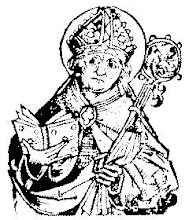Today is the memorial of the great Franciscan, Bishop and Doctor of the Church, St Bonaventure. From Universalis we see:
He was born at Bagnoregio in Etruria in about 1218. He became a Franciscan in 1243 and studied philosophy and theology at the University of Paris. He became a famous teacher and philosopher, part of the extraordinary intellectual flowering of the 13th century. He was a friend and colleague of St Thomas Aquinas.
At this time the friars were still a new and revolutionary force in the Church, and their radical embracing of poverty and rejection of institutional structures raised suspicion and opposition from many quarters. Bonaventure defended the Franciscan Order and, after he was elected general of the order in 1255, he ruled it with wisdom and prudence. He is regarded as the second founder of the Order.
He declined the archbishopric of York in 1265 but was made cardinal bishop of Albano in 1273, dying a year later in 1274 at the Council of Lyons, at which the Greek and Latin churches were (briefly) reconciled.
Bonaventure wrote extensively on philosophy and theology, making a permanent mark on intellectual history; but he always insisted that the simple and uneducated could have a clearer knowledge of God than the wise.
He was declared a Doctor of the Church in 1588 by Pope Sixtus V.

In our diocese it is also the memorial of St Swithun, the Anglo-Saxon Bishop of Winchester who died in 862. Probably the most well known thing about St Swithun is the folk lore that says whatever the weather may be on St Swithun's Day is the what the weather will be for the next forty days.
St Swithun's day if thou dost rain
For forty days it will remain
St Swithun's day if thou be fair
For forty days 'twill rain no more
As it's pretty grim today, I think I'll take the view it's all an old wifes tale!






